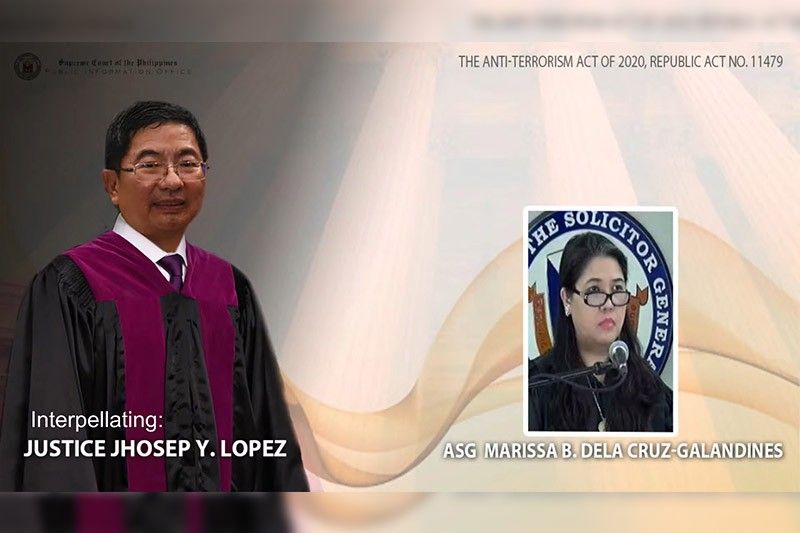'Truth tagging' rhetoric reaches SC as anti-terror law debate resumes

MANILA, Philippines —In Supreme Court debates on anti-terrorism law, the Office of the Solicitor General brushed off claims that the government engages in red-tagging — the practice of labeling critics as communists, rebels or terrorists.
Petitioners against the Anti-Terrorism Act of 2020 have long argued that the law may be used to target critics of the government and be labelled as communist terrorists. Under the law, the Anti-Terrorism Council may “designate” terrorists and the list may be published on its website and newspapers—the “mother of red-tagging,” as petitioner Bayan Muna said.
Justice Ricardo Rosario noted in his interpellation on Tuesday that officials of the National Task Force to End Local Communist Armed Conflict accused Patricia Non, organizer of pioneering Maginhawa community pantry, of communist links.
“How will the government ensure that the ATA will not unduly or unlawfully identify any person as a suspect of terrorism merely on the basis of suspicion? Does this incident support the allegations of petitioners of future contingent surveillance and red-tagging?”
READ: Gov't lawyer quizzed on how anti-terrorism law could affect charities, community pantries
Galandines did not exactly address the question but instead claimed that the government prefers not to use the term red-tagging. She also incorrectly claimed that the term is used only by leftists, although an opinion penned by Associate Justice Marvic Leonen in a Zarate v. Aquino III explained the practice of “red-baiting.”
There is also a pending bill seeking the criminalization of red-tagging when done by government officials.
Rosario said: “You resent my choice of word 'red tagging', is that what youre trying to point out… Was it wrong for me to do so?”
Galandines replied: “Your honor, red-tagging. The government is firm that what it does is, it is the submission of the government that what it does is 'truth tagging' and not red-tagging your honor.”
In last week’s session, Bayan Muna chairperson Neri Colmenares flagged Solicitor General Jose Calida’s “imputation of crime” on him and other petitioners in the government lawyer’s opening statement.
SC that the “government is not the enemy” and went on to cite raids where firearms, ammunitions and explosives were recovered, supposedly from the New People’s Army.
The solicitor general then mentioned a raid in Oriental Mindoro and then in Sta. Rosa, Laguna where, the solicitor general said, police also recovered "subversive documents, streamers, campaign paraphernalia of Congressman [Neri] Colmenares, Bayan Muna and Gabriela."
READ: In defending ATA, Calida references Duterte: Nothing to be afraid of if you're no terrorist
Due process
In his interpellation, Justice Edgardo Delos Santos pointed out that the consequences of designation as terrorists are criminal in nature, such as the freezing of assets and detention which means deprivation of liberty.
“Is it not indispensable that due process requirements should be complied with such as notice and opportunity to be heard?” the justice asked.
Under Section 25 of the law, the Anti-Terrorism Council, upon finding of probable cause, may designate individuals, groups, organizations and associations, whether domestic or foreign, as terrorists.
The law’s Implementing Rules and Regulation meanwhile note under Rule 6.3 that the ATC “shall adopt mechanisms to collect or solicit information from relevant government agencies and other sources in order to identify individuals, group of persons, organizations or associations, on the basis of probable cause, meet the criteria for designation under this Rule.”
Galandines asserted that designation is an executive and administrative function of the Anti-Terrorism Council. There are also no “production and weighing of evidence” as designation does not amount to conviction.
“Therefore the designation does not amount to conviction. No penalty is automatically attached to the performance of that executive and administrative function and therefore there is no transgression of the due process principles in our Constitution,” she said.
Appeal
Galandines also asserted that designation is merely for the purposes of applying a freeze order on assets of suspected terrorists.
But Associate Justice Jhosep Lopez, citing his experience when he was at the Court of Appeals, said they had cases related to the Anti-Money Laundering Council where freeze orders can be obtained without designation.
“Would you think it is a surplusage and is designation by itself a penalty because in the eyes of the law you are already designated a terrorist in fact in the eyes of your family friends, relatives, neighbors and of the entire country know and in their eyes that you are already a designated terrorist. So do you think this is not a surplusage that need not be put into the law?” he said.
Galandines reiterated that designation is not a conviction and no penalty is automatically attached to this function.
The IRR of the law said that designated terrorists may appeal for delisting—although Anti-Terrorism Council has yet to iron out its internal guidelines for this.
The government lawyer claimed this is a safeguard of the law as provided under Section 46 (n), which states that the ATC has the function to “investigate motu propio or under complaint any report of abuse, malicious application or improper implementation by any person of the provisions of this Act.”
Galandines also said parties who do not agree with the resolution of the ATC can appeal to the Office of the President. It is unclear how the OP can handle matters on action of the ATC, composed of Cabinet officials that concerned terrorism.
After running to the OP, parties may go next to the Court of Appeals under Rule 43 of the Rules of Court. Galandines said. The said rule covers appeals from judgments of quasi-judical agencies such as the OP.
But Lopez said: “Try to look into that again.”
SC debates on the petitions against the anti-terrorism law will resume on May 11.
- Latest
- Trending
































